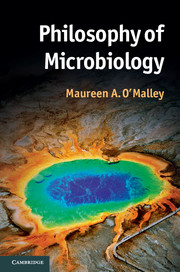Book contents
- Frontmatter
- Contents
- List of figures and tables
- Acknowledgements
- An introduction to philosophy of microbiology
- Chapter 1 Philosophy in microbiology; microbes in philosophy
- Chapter 2 Philosophical debates in high-level microbial classification
- Chapter 3 Philosophical debates in species-level microbial classification
- Chapter 4 Philosophical issues in microbial evolution
- Chapter 5 Microbial ecology from a philosophical perspective
- Chapter 6 Microbes as model biological systems
- Conclusion: further philosophical questions
- Glossary
- References
- Index
Chapter 4 - Philosophical issues in microbial evolution
Published online by Cambridge University Press: 05 September 2014
- Frontmatter
- Contents
- List of figures and tables
- Acknowledgements
- An introduction to philosophy of microbiology
- Chapter 1 Philosophy in microbiology; microbes in philosophy
- Chapter 2 Philosophical debates in high-level microbial classification
- Chapter 3 Philosophical debates in species-level microbial classification
- Chapter 4 Philosophical issues in microbial evolution
- Chapter 5 Microbial ecology from a philosophical perspective
- Chapter 6 Microbes as model biological systems
- Conclusion: further philosophical questions
- Glossary
- References
- Index
Summary
The microbial world has major implications for how evolution is theorized and researched. Philosophy of biology has focused on the evolutionary theory developed for animals and plants. This chapter will examine what happens to philosophical analyses of evolution when prokaryote evolution is taken into account. I will do this by focusing on several evolutionary processes that are often claimed to distinguish microbial evolution from macrobial evolution. The chapter will conclude with reflections on the ways in which microbial evolution might be the more encompassing way of thinking about and investigating evolution in general.
Microbes and the modern synthesis of evolutionary biology
It is now commonly thought that microbes should fit into the modern synthesis of evolutionary biology, either as simpler versions of multicellular sexually reproducing organisms, or – in the case of prokaryotes – as somewhat anomalous phenomena that do not greatly perturb evolutionary theory. However, this has not always been the case in the history of evolutionary biology. Even now, a number of contemporary microbiologists and other biologists are more inclined to embrace the idea that ‘bacteria are different’ (Levin and Bergstrom 2000: 6981). They give several reasons for this claim. Prokaryotes and many other unicellular organisms do not need to recombine genomes to reproduce. They commonly multiply themselves through binary fission, thereby giving rise to genetically identical clonal lineages. Because prokaryote genomes are not in a nucleus or specialized germ cell, they are often argued to be ‘more directly exposed to environmental influences than the germline DNA of animals’ (Sharp and Agrawal 2012: 6142). This exposure makes prokaryote genomes more vulnerable to DNA damage and thus more mutable. Bacteria in particular are known to possess ‘mutator’ genes, which allow elevated rates of mutation. Prokaryote genomes are also more open to the introgression (incorporation) of foreign DNA.
- Type
- Chapter
- Information
- Philosophy of Microbiology , pp. 95 - 131Publisher: Cambridge University PressPrint publication year: 2014



